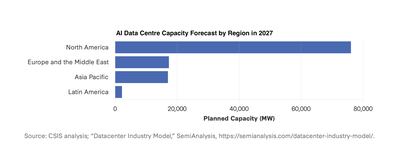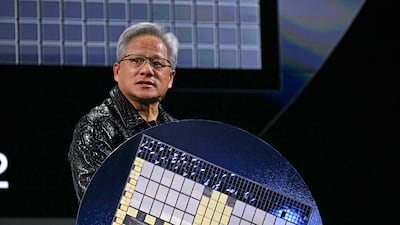One of the final policy guidelines issued by former president Joe Biden concerning artificial intelligence and the chips that make it possible is having ripple effects around the world, according to a report. The report from the Centre for Strategic and International Studies said that what was once a simple line drawn around China and a small number of countries has become something much broader.
It has become “a sweeping, interventionist framework that dictates not just who can import advanced semiconductors and how many, but where they can be deployed, under what conditions they must be secured, and even how AI capabilities can be shared,” the report states.

The report examines what the Biden administration described as an “interim final rule on artificial intelligence diffusion", saying these rules were designed to close loopholes and raise AI security standards. Yet many analysts noted that the AI diffusion rules were largely aimed at US efforts to blunt AI technological advancement in China.

Companies such as Nvidia, which has had unprecedented growth in recent years from sales of graphics processing units (GPUs) that are vital to AI infrastructure, were critical about the new interim rules, which ultimately cap computer chip sales to some countries.
“In its last days in office, the Biden administration seeks to undermine America’s leadership with a 200-plus-page regulatory morass, drafted in secret and without proper legislative review,” read a statement from Ned Finkle, vice president of government affairs at Nvidia.
Australia, Belgium, Canada, Denmark, Finland, France, Germany, Ireland, Italy, Japan, the Netherlands, New Zealand, Norway, South Korea, Spain, Sweden, Taiwan and the UK are the countries exempt from AI diffusion restrictions, falling into what has become known as the first tier of AI diffusion countries.
The CSIS report looked at countries not listed as exempt, including Malaysia, India, Indonesia, Saudi Arabia, Singapore and the UAE. Such nations in this “second tier” of the AI diffusion role make it more complicated, although not impossible, to obtain powerful GPUs and CPUs.
“A common rejoinder is that the AI Diffusion Rule only affects a handful of countries, since most global AI data centre capacity is already concentrated in the United States and Tier 1 nations,” the report read.
The third tier of countries, including China, Iran, North Korea, Russia, Syria and Venezuela, will have the most difficulty obtaining GPUs and CPUs under the new rules, which was largely the goal of the Biden policy.
“The controls we put on semiconductors and semiconductor equipment have all been about impeding the PRC’s [People's Republic of China's] ability to build the large language models that can threaten the US and its allies from a national security perspective,” Alan Estevez, former undersecretary of commerce for industry and security, said last month.
But many say countries in the second tier of AI diffusion restrictions are being unfairly hit. A source at Nvidia told The National that the rules will make it harder for various countries, many of them US allies such as the UAE, to build capacity for “non-frontier AI use cases”.
Frontier AI is a term used to describe highly capable AI models and technology that could pose severe risks to public safety. “This would capture a lot of GPUs that are included in gaming and other applications like health care and scientific research that don't have anything to do with frontier AI,” the source said.
As the CSIS report points out, however, countries that fall into the second tier do have the option of increasing the amount of GPUs they can obtain by applying for something called National Validated End User authorisation status, but only if they meet stringent security requirements.

“Broadly speaking, the new [AI diffusion] rule is likely to be a net negative for T2 nations with significant AI data centre capacity pipelines,” the report explained.
Although the new Trump administration has been quick to repeal many Biden administration policies, it has not announced plans to scrap the AI diffusion rule.
That decision might come down to US President Donald Trump's new Commerce Secretary Howard Lutnick, who was recently present during a meeting between Nvidia chief executive Jensen Huang and Mr Trump.
Details of that meeting were scarce, but an Nvidia source told The National that “strengthening US technology and AI leadership” were a major part of the conversation.
The CSIS report says the Trump administration will probably embrace and possibly expand the AI diffusion rule, but does not rule out the small window for making an abrupt policy shift given the political climate.
“If there is a better hand to play, now is the time to find it,” read the CSIS analysis. “And if there is anyone that thrives on breaking and remaking the playbook, it is President Trump.”


